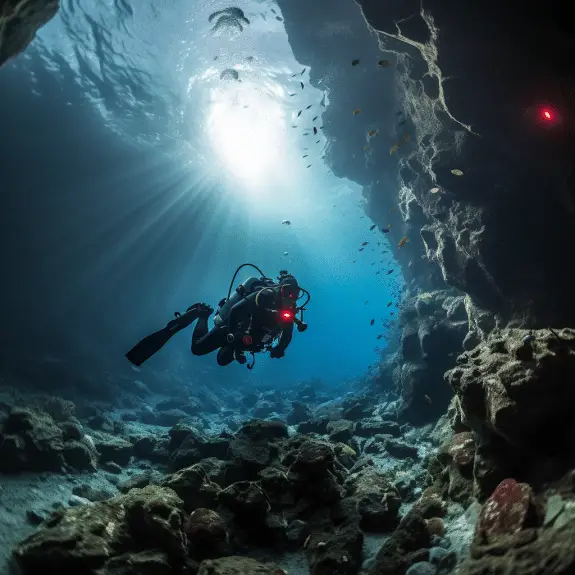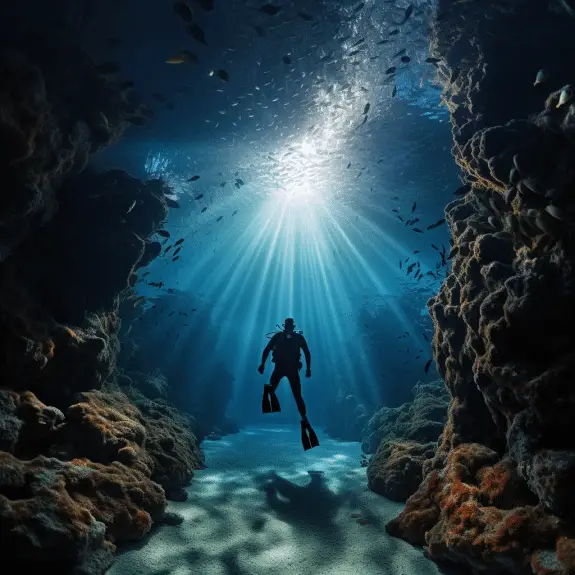Mastering Diving Have you ever dreamed of exploring the underwater world and discovering its secrets firsthand? Diving is a thrilling and rewarding activity that allows you to do just that. Whether you’re a beginner or an experienced diver, our expert guide will provide you with the essential tips and techniques to improve your diving skills and take your underwater adventures to the next level.
In this section, we will cover the basics of diving, including how to get started, what equipment you need, and important safety considerations. We will also provide you with beginner diving tips and diving techniques that will help you dive with confidence and proficiency.
Key Takeaways
- Learning how to dive can open up a whole new world of underwater adventure.
- Essential diving equipment includes a mask, fins, regulator, BCD, and dive computer.
- Proper safety measures are crucial in ensuring an enjoyable diving experience.
- Beginner diving tips and techniques can help you improve your skills and gain confidence in the water.
- Continuous learning and practice are essential for advancing your diving skills.

Exploring Diving Equipment and Best Diving Locations
When it comes to diving, having the right equipment can make all the difference. As a beginner, choosing the right gear can be overwhelming, but with the right guidance, you can find the equipment that suits your needs best. Let’s explore the essential diving equipment you need to have and how to choose the right gear for your diving adventures.
Diving Equipment Guide
Here’s a table that lists the essential diving equipment:
| Equipment | Description |
|---|---|
| Mask | Allows you to see underwater by creating a pocket of air around your eyes |
| Snorkel | Enables you to breathe while floating on the surface without having to lift your head out of the water |
| Fins | Helps you move more efficiently through the water and reduce fatigue |
| Regulator | Converts the high-pressure air from your tank into breathable air |
| BCD (Buoyancy Control Device) | Allows you to maintain neutral buoyancy and control your ascent and descent |
| Wetsuit | Keeps you warm and protected from the elements |
| Tank | Contains the compressed air you breathe underwater |
When choosing your diving equipment, it’s essential to consider the fit, comfort, and quality. Don’t rush into buying the cheapest equipment, as it can compromise your safety and comfort. Look for trusted brands and products that are well-maintained and regularly serviced.
Best Diving Locations
Now that we’ve explored the equipment, let’s dive into some of the best diving locations around the world. Whether you’re a beginner or an experienced diver, these destinations offer unique experiences and unforgettable memories.
- Great Barrier Reef, Australia: A world-renowned site with colorful coral, abundant marine life, and crystal-clear waters.
- Red Sea, Egypt: Known for its warm waters, vibrant coral reefs, and diverse marine life.
- Barracuda Point, Malaysia: An exciting dive spot with deep waters, schools of barracudas, and a stunning coral garden.
- Galapagos Islands, Ecuador: A remote location with a rich ecosystem and diverse marine life, including hammerhead sharks, sea lions, and penguins.
- Koh Tao, Thailand: A popular destination for beginner divers with warm waters, diverse marine life, and affordable courses.
These locations offer unique and breathtaking experiences, but there are countless other destinations worth exploring. Remember to research the best time to visit, seasonal weather patterns, and local regulations to make the most out of your diving adventures.
Ensuring Safety and Advancing Your Diving Skills
As you gain experience in diving, you will want to continue developing your skills to become a more confident and proficient diver. Here are some tips to help you advance your diving skills:
Finding Reputable Diving Instructors
One of the best ways to improve your diving skills is by finding a reputable diving instructor. A good instructor can help you build on the skills you already have, while also teaching you new techniques and critical safety measures. Look for instructors who are certified by recognized diving organizations, such as PADI or NAUI.
Mastering Underwater Diving Techniques
There are several techniques you can learn to help you become a more skilled diver, such as buoyancy control, underwater navigation, and proper breathing. Learning and practicing these techniques will help you become more confident and comfortable underwater.
The Diving Certification Process
If you’re serious about advancing your diving skills, you should consider obtaining a diving certification. This certification process involves a combination of classroom instruction, pool training, and open water dives. The certification will not only make you a safer and more competent diver, but it will also allow you to explore more challenging and exciting dive sites.
Diving Safety Tips
Regardless of your skill level, diving safety should always be a top priority. Always dive with a buddy, stay within your limits, and be aware of your surroundings. Additionally, make sure to check and maintain your equipment regularly, and follow all safety protocols and guidelines.

Diving Instruction
If you’re new to diving, taking an introductory diving course can give you the foundational knowledge and skills you’ll need to start exploring underwater. These courses typically involve classroom instruction, pool training, and introductory open water dives. An experienced instructor will guide you through the process and provide you with essential diving safety tips.
By following these tips and continuing to practice your diving skills, you’ll become a more confident and proficient diver, able to explore new and exciting underwater worlds with ease.
FAQ
How do I get started with diving?
To get started with diving, it is recommended to enroll in a beginner’s diving course. This course will provide you with the necessary knowledge and skills to dive safely. It is important to learn from qualified instructors who are certified by recognized diving organizations.
What equipment do I need for diving?
The essential diving equipment includes a mask, snorkel, diving fins, wetsuit or drysuit, buoyancy control device (BCD), regulator, dive computer, and weights. These items help you breathe underwater, control your buoyancy, monitor your dive, and protect you from the elements.
How do I choose the right diving gear?
Choosing the right diving gear is important for comfort, safety, and performance. It is recommended to try on different brands and models to find the gear that fits well and suits your diving needs. Consulting with experienced divers or diving instructors can also provide valuable insights and recommendations.
What are some of the best diving locations?
Some of the best diving locations around the world include the Great Barrier Reef in Australia, the Maldives, the Red Sea in Egypt, the Galapagos Islands, and Palau. These destinations offer diverse marine life, beautiful coral reefs, and unique underwater experiences.
How can I ensure safety while diving?
Safety should be a top priority while diving. It is important to follow the guidelines and instructions provided by your diving instructor or dive operator. This includes proper pre-dive checks, monitoring your air supply, practicing good buoyancy control, and always diving within your limits.
How can I advance my diving skills?
To advance your diving skills, you can consider pursuing further training and certifications. This can include specialties such as deep diving, underwater navigation, or underwater photography. Continuing education and diving regularly will also help improve your skills and confidence underwater.
What is the process for diving certification?
The process for diving certification involves completing a series of training modules that cover theoretical knowledge, practical skills, and open water dives. These training modules are typically provided by diving organizations such as PADI or SSI. Once you have completed the required training and met the necessary requirements, you will receive a diving certification card.
How do I find reputable diving instructors?
To find reputable diving instructors, it is recommended to research diving centers and schools that have good reviews and a strong reputation. You can also seek recommendations from experienced divers or contact diving organizations for a list of certified instructors in your area.
What are some underwater diving techniques I should learn?
Some important underwater diving techniques to learn include proper buoyancy control, equalizing your ears, using hand signals for communication, and developing good spatial awareness. These techniques will help you navigate underwater safely and interact with the marine environment effectively.
